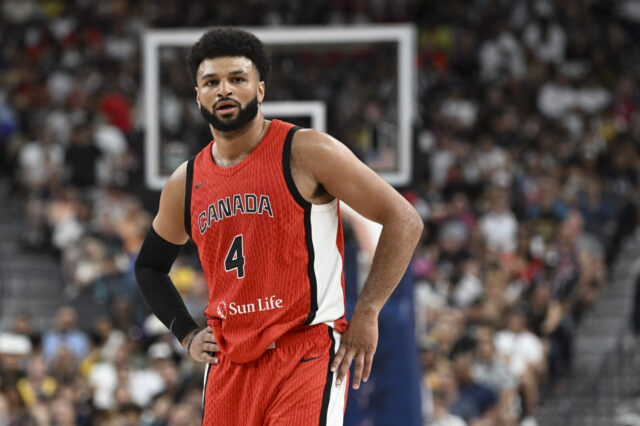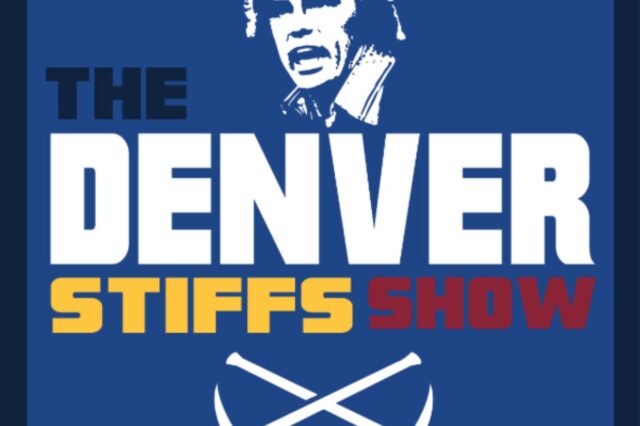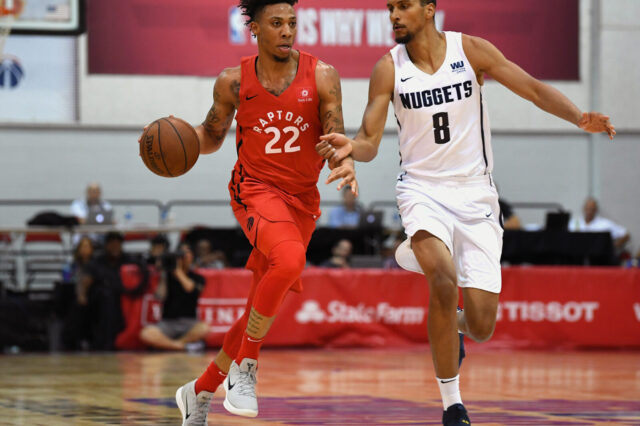 With most of Nuggets Nation focused on what player moves the Nuggets might or should make this offseason, the organization has to deal with a more pressing – and perhaps more important – free agency situation.
With most of Nuggets Nation focused on what player moves the Nuggets might or should make this offseason, the organization has to deal with a more pressing – and perhaps more important – free agency situation.
In addition to the looming free agency of players like Joey Graham, Johan Petro, Anthony Carter and Malik Allen, both of the Nuggets “general managers,” vice president of basketball operations Mark Warkentien and vice president of player personnel Rex Chapman, are free-agents-to-be, as well. (It should be noted that vice president of team development, Josh Kroenke, is under contract as far as I can tell.)
Before getting into the debate of whether or not the Nuggets should keep Wark or Rex or both (or neither), it should be noted that the Nuggets organizational structure isn’t as odd as many in the local media have made it out to be. Granted, having essentially two GMs on the same level is a bit unorthodox by NBA franchise standards, but more franchises than not conduct business-by-committee these days. The Bulls have John Paxson (vice president) and Gar Forman (general manager) who make their personnel decisions. The Spurs have RC Buford (general manager) and Gregg Popovich (vice president and head coach) manning the ship in San Antonio. The Nets have Rod Thorn (president) and Kiki Vandeweghe (general manager) in charge in New Jersey. And so on.
A number of other teams, conversely, function with one man in charge which is a more traditional way to go. For the Lakers, it’s Mitch Kupchak who carries the title of general manager. For the Utah Jazz, it’s Kevin O’Connor who gets the dual title of general manager and “senior” vice president of basketball operations. And in Detroit, Nuggets fan favorite Joe Dumars (the gift that keeps on giving) serves alone as president of basketball operations.
In other words, there’s no set way to run a franchise and in virtually all cases, NBA owners have final say over management decisions anyway.
For the Nuggets, the basketball operations team is comprised of five key decision makers. There’s Bret Bearup, who carries the title of adviser and was referred to in a May 2009 Wall Street Journal article as owner Stan Kroenke’s “basketball consigliere”, there’s Warkentien and Chapman, who split the GM duties and report to Bearup, there’s the younger Kroenke, Josh, and of course, there’s the elder Kroenke, the team owner who happens to be a basketball aficionado. Don’t think for a second that a decision gets made without Stan Kroenke’s input and approval. After all, at the end of the day he’s the one who has to sign the checks.
From any objective standpoint, this management team has done a good job since taking over in 2006 for Vandeweghe, who deserves credit for making the Nuggets relevant again at Kroenke’s behest. From Vandeweghe, Bearup, Warkentien and Chapman inherited a perennial playoff team with a bloated payroll and were tasked with turning that outfit into a championship team. If we judge our general managers by championships, they’ve failed. But if we judge our general managers by putting the team in position to win a championship (as I do), I think most fans would agree they’ve done a good job.
In fact, when I (erroneously) blamed George Karl’s coaching in 2007-08 as the main reason for the Nuggets not competing for the championship that season, it was mostly because I was enamored with the roster put together by Bearup, Warkentien and Chapman. At that time, I was convinced that a roster comprised of Carmelo Anthony (a Vandeweghe draftee), Kenyon Martin (a Vandeweghe signing), Marcus Camby (a Vandeweghe acquisition), Allen Iverson (a Bearup/Warkentien/Chapman acquisition), J.R. Smith (a Bearup/Warkentien/Chapman acquisition) and Linas Kleiza (a Vandeweghe draftee by way of acquisition) was a 60-win, championship-caliber team, and not the 8th-seeded playoff quitters they turned out to be. But I had overlooked the fact that a toxic locker room, caused in large part by the players brought in by the current management team, had just as much to do – if not more – with the Nuggets coming up short than anything Karl was doing. And with the benefit of hindsight, it’s pretty clear to us all how valuable Karl is to a team versus the likes of Iverson or J.R. In fact, it’s not even close.
But to the credit of Bearup, Warkentien and Chapman, they too knew that the A.I. experiment was ultimately a loser and they cut their losses as soon as the opportunity arose. By signing hard-working, high-character guys like Dahntay Jones and Chris Andersen two summers ago, followed up by shipping A.I. to Detroit for Chauncey Billups, Bearup, Warkentien and Chapman gave Karl a real team to coach. And coach them he did…all the way to the 2009 Western Conference Finals. And most of us – me included – believe that had Karl not been beset by throat and neck cancer this past season, a repeat appearance in the conference finals was likely. At the very least, the Nuggets would have won about 54 to 55 games and one playoff series.
My point of recapping all this is that for the past three years of the Bearup, Warkentien and Chapman Administration, the Nuggets have assembled – on paper – a team capable of winning multiple playoff series. And they’ve done so under presumably strict orders from Kroenke to stay below the luxury tax line, hence why acquisitions like Jones, Andersen, Renaldo Balkman (even though Karl refuses to play him) and more recently Arron Afflalo and Ty Lawson are such steals. Lest we forget that out of 30 NBA markets, the Nuggets rank 17th in market size.
The problem, however, with having a committee in charge of basketball operations in which two of its members are due for contract extensions is knowing who deserves the credit for this recent success. I suspect Bearup, Kroenke and Karl can answer that question better than any of us can, but we can read between the lines a little bit and attempt to draw our own conclusions.
First off, it was Warkentien – and not Chapman – who won the 2008-09 NBA Executive of the Year Award by receiving nine of the 30 votes from a panel of NBA executives. Chapman received one. Right there, that shows you who other executives think is running the show in Denver. But those of us who follow the Nuggets closely know that should have been a shared award, as I pointed out on May 3, 2009. Most tellingly, however, when Warkentien won the award he was twice quoted as saying “it’s a team honor”, while never once mentioning Chapman’s name specifically.
Whether it’s fair or not or true or not, Warkentien won the award because there’s a perception that he gets credit for completing the major deals that have helped shape this team since his arrival. Wark often gets props for bringing in J.R. Smith in exchange for two second round draft picks and Howard Eisley from the Bulls. An absolute fleece job regardless of how we feel about J.R. these days. Wark also received credit in the eyes of the award voters for swindling Dumars into taking A.I. for Chauncey, and for signing Jones and Andersen off the NBA scrap heap. And this past offseason, Wark got credit for acquiring Afflalo in exchange for a second round pick and for weaseling his way into the draft to snag Lawson, a steal at the 18th spot in the draft. So while it’s unclear as to who sources or brainstorms these deals (is it Bearup, Warkentien, Chapman, Kroenke, Karl, a team scout, etc?), it’s Warkentien who often ends up getting quoted and taking credit for completing them.
But if Warkentien wants to take the public credit for the good deals then he must take the blame for the bad ones, too. To this day I refuse to buy that dumping Marcus Camby’s salary on the Clippers in exchange for the right to swap second round picks was the best possible deal available considering how few quality big men are left in the NBA. And I still fear that Warkentien is too enamored with his own deal making and overlooks character and team chemistry in the process. Was acquiring Allen Iverson in a trade for Andre Miller, Joe Smith and a pair of first round picks a good deal? On the surface, absolutely. But an NBA insider of Wark’s caliber had to know the influence a guy like Iverson – he of the drinking, partying and no-practicing variety – would have on the young, impressionable Nuggets. The rest of us didn’t realize it until the rumors of Iverson’s boorish behavior started leaking out and by then, it was way too late.
But none of us should be surprised. Wark learned his trade in Portland at the feet of “Trader Bob” Whitsitt whom, together with Warkentien, assembled one of the most talented, least likable and most arrested teams in NBA history. You know, the doomed-for-failure Jailblazers. And had the Nuggets not done an about-face in 2008 by bringing in some good character guys (something Chapman allegedly pushed for as Sandy Clough noted in our last interview), the Nuggets were on the verge of becoming the Jailblazers 2.0. Remember when (the often wrong) Peter Vecsey reported that Jamaal Tinsley was heading to the Nuggets? Or the reported interest from Warkentien in Zach Randolph? And those are just the alleged deals we fans heard about. How many times have Chapman or Bearup had to keep Warkentien’s obsession with talent in check?
And that brings us to Chapman. If Warkentien is the deal-closer, presumably hiding in his office while pouring over statistical analysis, constantly working the phones or traveling to scout the next Lawson for possible acquisition, what role does Chapman serve? From what I can deduce, Chapman – having played in the league as recently as 1999-2000 – puts his basketball instincts up against Wark’s wonkish-ness and, along with Bearup, helps source deals for the Nuggets. Wark acknowledged Chapman’s value as an ex-player when the two first got the job in Denver: “It’s always good to have an ex-player helping out. I can’t tell you how many meetings I’ve been in with different NBA franchises where a thought comes into the conversation by an ex-NBA player and you’re like, ‘Holy smokes, that’s a good thought.’” A little condescending to be sure, but hey, that’s Mark Warkentien.
In that same Wall Street Journal article referenced above, Chapman claimed that the Nuggets “act on instinct rather than spreadsheets.” But I think that’s just Chapman’s point of view. After all, Dean Oliver, regarded as one of the most astute basketball statisticians around, is on the team payroll and works closely with Warkentien and Bearup. This I know for a fact because on the few occasions I’ve met Oliver – a very smart and great guy – he’s been with either Bearup, Warkentien or both.
Unfortunately for Chapman, the days of running a professional sports outfit on instinct are coming to an end. If memory serves, Dan Issel ran the Nuggets on instinct and we’ve all seen how well Joe Dumars’ “instincts” are treating Pistons fans right now (I once heard from a great source that Dumars does no statistical analysis and “just goes with his gut”). Conversely, as far as Warkentien is concerned the days of assembling talent at all costs and above all else are over, too. In 2010, you have to have a GM who understands quantitative analysis and has basketball instincts, a la Sam Presti in Oklahoma City, Daryl Morey in Houston and RC Buford in San Antonio. And with Warkentien and Chapman the Nuggets get both, but having two GMs, two egos and, from Kroenke’s perspective, two contracts to pay for can be problematic.
Knowing this, Clough put me on the spot in our last interview and asked who’d I pick: Rex or Wark? My short answer was Wark, although it’s a bit of a false choice. But when considering the financial strains the Nuggets find themselves in as a result of their small market stature and the NBA’s current collective bargaining system, the Nuggets must take advantage of statistical analysis and salary cap loopholes to remain competitive. And based on the deals Wark has been able to complete (regardless of who gets credit for sourcing them), it’s hard to argue that there’s anyone better in the league at getting off-the-cuff and under-the-radar deals done. Hence why the Denver Post’s Chris Dempsey recently wrote that “it would be extraordinarily bad for the Nuggets if [Warkentien] were to go.”
That said, I’m not convinced that Warkentien’s penchant for talent above all else has abated yet, and I like that Chapman is there to keep Warkentien in check and give a fairly modern ex-player’s point of view on all possible deals. And thus to be clear, my preference would be to extend both Warkentien and Chapman for a few more years.
Having overseen three consecutive 50-win seasons – something that has never happened in the Nuggets NBA franchise history – Wark and Rex would probably be granted extensions if this were any other organization. But in a shrewd move, my understanding is that Kroenke has both GMs under contract through the early fall. This bodes well for Nuggets fans. This means that both Wark and Rex will be under the gun this offseason to work together while finding creative ways to improve the Nuggets, whether it be parting with Kenyon Martin’s expiring contract and/or trading J.R. Smith to land a big man, finding a way to get into the draft or all of the above.
If the Nuggets don’t improve over the summer, our five-man decision making team might be reduced to four…or three.


